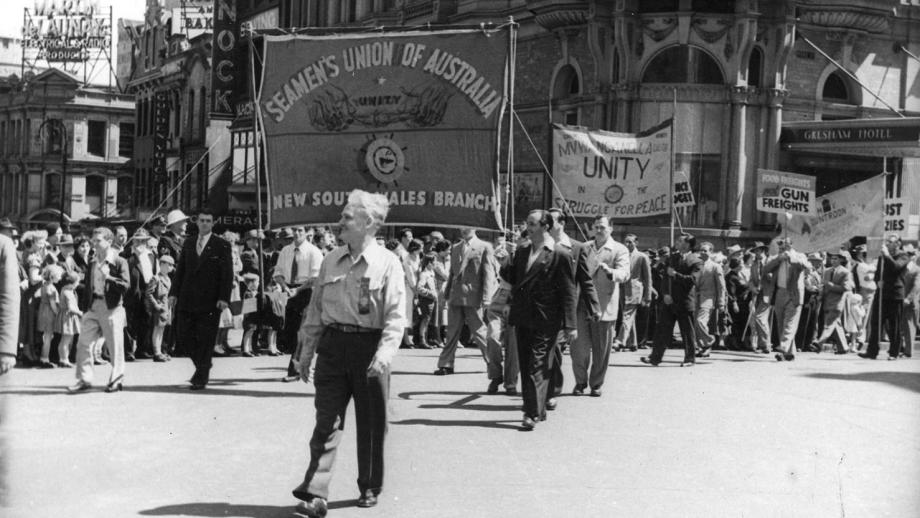Eliot Valens Elliott was born Victor Emmanuel Elliott in New Zealand in 1902. He joined the Federated Seamen’s Union of Australasia (FSUA), later the Seamen’s Union of Australia (SUA) at the age of 17 and worked stoking boilers. He quickly earned a reputation as a tough delegate focused on campaigning for better working conditions. Elliott came to prominence during the 1935 seamen’s dispute as Assistant-Secretary of the Sydney strike committee and was elected Queensland Branch Secretary of the FSUA. By late 1924 his sailing records showed a change of name to Eliot V Elliott.
Elliott once claimed that he became a union official in order “to earn a quid so I can eat” after being blacklisted by shipping companies, but he demonstrated a great aptitude for the job. Like Waterside Workers’ Federation General Secretary, Jim Healy, he was a modern trade unionist and possessed a unique vision for a progressive national union. He was also a committed communist and member of the Communist Party of Australia (CPA). He strove to combine a radical vision of socialism with realistic bargaining tactics.
He became General Secretary of the FSUA in 1941 and in 1942 served as the seamen’s representative to the Maritime Industry Commission. He was also active in the international labour movement, sponsoring union recruitment and organisation among Australian and visiting seamen and promoting collective action by Chinese, Greek and Indonesian seamen. Although he led the SUA in their opposition to the Korean and Vietnam Wars, he generally relied on negotiation skills rather than engaging in costly strike action. He was a fierce opponent and defended the rights of SUA members in bitter battles with BHP and the Utah Development Co.
In 1949 Elliott joined the CPA’s central committee and was appointed vice-president of the maritime section of the World Federation of Trade Unions (WFTU), which had strong backing from the USSR. Although the Australian Council of Trade Unions withdrew from the WFTU that same year, the SUA didn’t disaffiliate until September 1952. Elliott maintained a long-term pro-Moscow view, which contributed to his removal from the central committee of the CPA in 1969, and him joining the new Socialist Party of Australia in 1971.
Elliott's long-time partner was prominent trade unionist and activist Kondelea Xenedohos (more commonly known as Della Elliott), whom he met while both were working for the WWF.
After 37 years as General Secretary, he retired from the SUA in 1978. He died in Sydney on 26 November 1984, survived by Della and his son.
References
Australian Communist Party n.d., Eliot V. Elliott, accessed <https://www.auscp.org.au/history/elliot-v-eliot>
Morris, R 2007, Eliot Valens Elliott, Australian Dictionary of Biography, volume 17, National Centre of Biography, Australian National University, accessed <http://adb.anu.edu.au/biography/elliott-eliot-valens-vic-12458>
Cahill, R n.d., Eliot Valens Elliott 1902-1984, Australian Society for the Study of Labour History, accessed <https://www.labourhistory.org.au/hummer/no-8/eliot-valens-elliott/>





